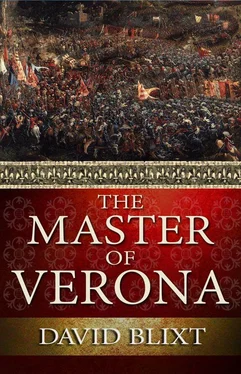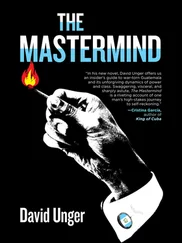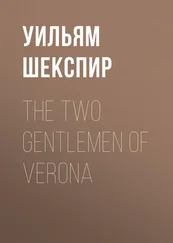David Blixt - The Master of Verona
Здесь есть возможность читать онлайн «David Blixt - The Master of Verona» весь текст электронной книги совершенно бесплатно (целиком полную версию без сокращений). В некоторых случаях можно слушать аудио, скачать через торрент в формате fb2 и присутствует краткое содержание. Год выпуска: 2012, Издательство: Sordelet Ink, Жанр: Исторические приключения, на английском языке. Описание произведения, (предисловие) а так же отзывы посетителей доступны на портале библиотеки ЛибКат.
- Название:The Master of Verona
- Автор:
- Издательство:Sordelet Ink
- Жанр:
- Год:2012
- ISBN:нет данных
- Рейтинг книги:5 / 5. Голосов: 1
-
Избранное:Добавить в избранное
- Отзывы:
-
Ваша оценка:
- 100
- 1
- 2
- 3
- 4
- 5
The Master of Verona: краткое содержание, описание и аннотация
Предлагаем к чтению аннотацию, описание, краткое содержание или предисловие (зависит от того, что написал сам автор книги «The Master of Verona»). Если вы не нашли необходимую информацию о книге — напишите в комментариях, мы постараемся отыскать её.
The Master of Verona — читать онлайн бесплатно полную книгу (весь текст) целиком
Ниже представлен текст книги, разбитый по страницам. Система сохранения места последней прочитанной страницы, позволяет с удобством читать онлайн бесплатно книгу «The Master of Verona», без необходимости каждый раз заново искать на чём Вы остановились. Поставьте закладку, и сможете в любой момент перейти на страницу, на которой закончили чтение.
Интервал:
Закладка:
Upon spying the Count, Vanni called, "Ho! Ho ho!" The Toothless Master was drunk. He attempted to dance a quick step on the cobblestones but hit his head on a blackened wooden sign hanging above him. Cursing, he drew his sword and unleashed a flurry of drunken blows on the offending slab of wood. The Flemish soldiers gleefully urged him on.
Ill luck chose that moment for the Podestà to ride up. Having emerged from his tent against advice, he'd ridden with Albertino Mussato to see how the demolition was coming. When he saw Asdente, he looked like he was about to have a fit. "Scorigiani! What the hell do you think you're doing, man? Are you incompetent as well as cruel?"
"Lord?" puzzled Asdente.
At last the Podestà found a target for his frustrations. "You're drunk, man! Have you no shame? Here are men, gentlemen, men of high birth, doing the work of common labourers, while you drink and carouse with your pet mercenaries! What kind of man are you? Certainly no gentleman! You don't deserve your knighthood! This whole day has been a fiasco because of behavior like yours! We could own the city now if it weren't for the base impulses of your men! What have you got to say for yourself?"
Asdente was sober enough to take offence. The Count watched as Vanni considered using his sword to rid them all of this jumped-up Cremonese who was so obsessed with dignity and honour that he couldn't lead his men. Of course, if Vanni did kill the Podestà , he'd be executed for murder. There were too many witnesses who could testify that it wasn't a proper duel. Mussato, the historian with a flair for the dramatic, was watching with interest. Ponzino didn't even have a sword. There was no way for Vanni to kill the weak-livered bastard and get away with it.
Weighing the scales of intervention, the Count decided it would be worth Vanni's death if this enterprise could be led by a practical, competent man. Giacomo da Carrara would take charge, and though Il Grande had his honour, it never got in the way of hard decisions. So when Asdente moved forward with blood in his eye, the Count did not move.
From somewhere nearby they heard the sound of hoofbeats. Two horses were pounding the stones towards them. Beneath that sound, a little further away, there came thunder. The Count glanced upwards. No, the clouds haven't moved . Yet the thunder continued, rumbling closer to them.
The Count was so tired that it took several long moments before he recognized the sound for what it was — the echoes of a mounted force galloping down paved city streets.
Vanni recognized it sooner. Besotted, honourless man he may have been, but he'd been a soldier all his life. Blind with drink, he ran to a nearby water trough and plunged his head in. Emerging, he quickly ordered his Flemings to abandon the trophies and draw their weapons. Trouble was approaching through the roiling cloud of smoke that enveloped the suburb.
Seconds later Marsilio and his uncle Giacomo burst out of the cloud bank, scarlet faces matching their family's scarlet crest. "They're coming!" both men shouted. There wasn't time for anything more.
Vinciguerra raced for his horse, tethered just inside the wall to the left of the arch. As he ran he reached out a hand and plucked up his breastplate from where it lay, scalding his fingers on the hot metal. All his senses were alert, his weariness banished in a rush of blood. Despite the horrid feeling of being unprepared, a strange gladness billowed up inside him. There couldn't be many attackers, only what the garrison could muster. Two hundred men, perhaps three . The Vicentines would ride out and attack, kill maybe as many Paduans. It was just the spur the Paduans needed. Anger at being taken unawares and a thirst for revenge would carry them through these attackers right on to the city gates. Those gates would fall and Vicenza would belong to Padua.
The only task now was to stay alive long enough to see it. The Count was just turning his horse, armour dangling from his fingertips, when something emerged from the smoke. Expecting a horse, he was amazed to see a dog — a wiry black greyhound with teeth bared, jaws snapping. Tears streamed down its face from the smoke, making it appear even more awful.
Then came the horse. At first only the legs were visible from out of the swirling black cloud, then a head emerged, a wide horse's head hidden by the leather and metal headpiece. The Count recognized the device between the eyes, below the single spike, as the Nogarola eagle.
The next stride of the horse brought into view a giant in a billowing scarlet cloak. A silver helmet was fixed on his head, plumeless and fierce. He bore no shield, but wielded a huge mace with studded spikes. He was not the short, broad Antonio Nogarola. This knight was high as a mountain, towering over the beast he rode. Probably the family champion, if they had one. Who else would be using their armour and horses?
Whoever he was, he was frightening to behold. The Count saw him make the sign of the cross on his forehead, then stand in his stirrups to keen a loud war cry. Behind him, bursting out of the foul smoke, more armed horsemen emerged. The wind shifted, and the smoke funneled up, revealing a wall of men.
Count Vincinguerra da San Bonifacio turned his horse and rode for his life. Ahead of him the Podestà was doing the same. San Bonifacio kicked his heels to force his big horse across the bridge. On either side of him rode a Carrara, and just ahead to his right the Podestà and Mussato.
Suddenly the historian's horse pitched forward. Mussato's mount had stuck its foot in a hole in the planks and fallen, snapping its leg. Now man and beast were a barrier across the Count's path. Vinciguerra was unable to do anything but ride on. He heard a scream from beneath him. Poor luck, poet .
Back at the half-demolished gate, Vanni Asdente led his men afoot into the attackers' flank. Under his direction four horses went down on the right side of the Vicentine column. The Vicentines stopped, turned, and began the process of decimating the drunken Flemings. In spite of the howling and spitting Asdente, the sixty Flemings lost their nerve and edged under the stone arch to run across the bridge, only to be cut down as they presented their backs to the mounted soldiers. Asdente disappeared among his own fleeing men.
The main body of galloping Vicentine horsemen continued on under the stone arch and over the bridge to bring destruction to the army that outnumbered them more than fifty times. Ahead of them, the Count followed Ponzoni and the two Carrarese to where the Paduan army disported itself in the gardens and hills beyond the moat.
Paduan soldiers struggled to their feet, reaching for weapons. It was as the Count had hoped — threat was stirring them to action. Satisfied, he pulled up at his reins, halting in the center of the line. He still held his breastplate, the family crest blazoned across it. But his grandfather's helmet was lost on the bridge. No matter. If this worked right, he'd have it back in a very few minutes.
The Vicentine force checked just this side of the bridge, watching the twenty remaining Flemings run for safety. The tall Nogarola champion shifted in his saddle as he waited, his back to the banks of the moat. The Vicentines lined up behind him. The Count watched with grim pleasure as the Vicentine champion took in the numbers he faced. He couldn't possibly ignore the vast horde of men arrayed against him. Even disorganized as the Paduans obviously were, the odds were impossible. The champion would count it a moral victory and order his men back. But the moment he turned, San Bonifacio would lead a charge and destroy this force, then press on to the center of the city and victory.
The champion did not turn back. With the hound prowling about at his horse's legs, he stood in his stirrups and tore the helmet from his head. Light from the western sun set the hair ablaze. Dangerously handsome, the face was clear to all. Even those who had never seen him knew who he was. Cangrande della Scala, the Greyhound, in all his glory.
Читать дальшеИнтервал:
Закладка:
Похожие книги на «The Master of Verona»
Представляем Вашему вниманию похожие книги на «The Master of Verona» списком для выбора. Мы отобрали схожую по названию и смыслу литературу в надежде предоставить читателям больше вариантов отыскать новые, интересные, ещё непрочитанные произведения.
Обсуждение, отзывы о книге «The Master of Verona» и просто собственные мнения читателей. Оставьте ваши комментарии, напишите, что Вы думаете о произведении, его смысле или главных героях. Укажите что конкретно понравилось, а что нет, и почему Вы так считаете.












